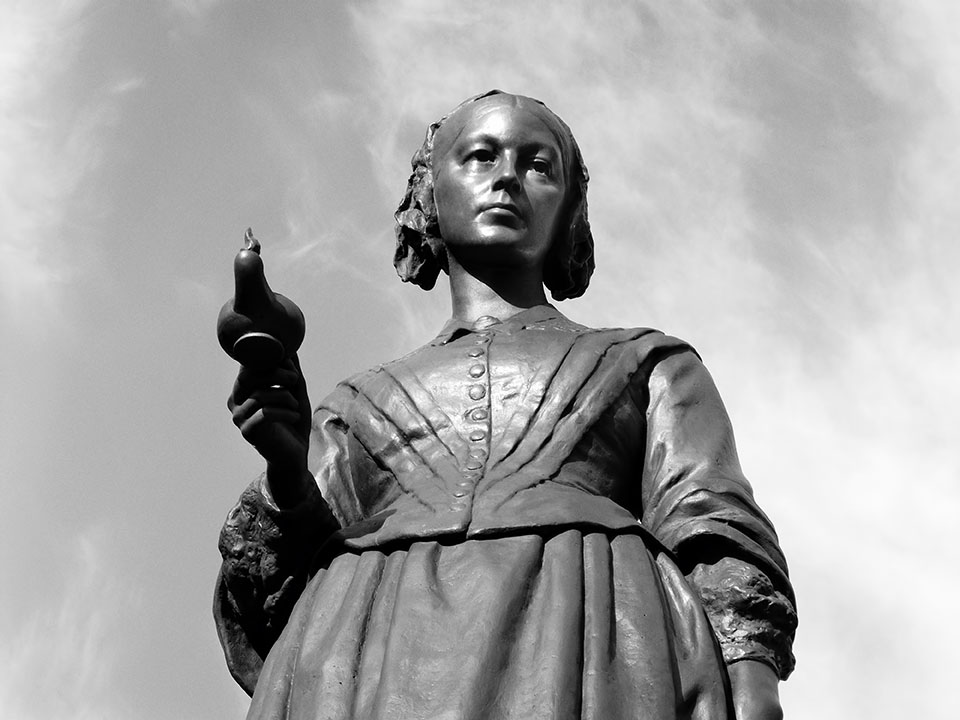

Florence Nightingale was a nurse, statistician, and social reformer who was instrumental in the development of modern nursing. She is considered the founder of modern nursing, and her work has had a profound impact on the care of sick and injured people around the world.
Nightingale was born in Florence, Italy, in 1820. She was a bright and independent child, and she was determined to become a nurse, even though it was not considered a respectable profession for women at the time.
In 1854, Nightingale volunteered to go to Turkey to help care for the wounded soldiers during the Crimean War. She set up a hospital in Scutari, and she worked tirelessly to improve the conditions there. She introduced new methods of hygiene and sanitation, and she also helped to provide food and comfort to the soldiers.
Nightingale's work in the Crimea made her a national hero. She was called "The Lady with the Lamp" because she would often walk through the hospital at night, checking on the patients.
After the war, Nightingale returned to England and continued to work to improve the care of sick and injured people. She founded the Nightingale School of Nursing, and she wrote several books about nursing. She is considered the founder of modern nursing.
Nightingale's work was based on the belief that nurses should be trained professionals who provide holistic care to their patients. She also believed that hospitals should be clean and well-organized and that nurses should have a say in how hospitals are run.
Nightingale's work had a profound impact on the care of sick and injured people around the world. She helped to raise the status of nursing, and she made it possible for women to have a career in nursing. She also helped to improve the quality of care in hospitals, and she paved the way for the development of modern nursing.
The Florence Nightingale Pledge is a promise that all nurses make to uphold the highest standards of care.

There are no other forms of the word "Florence Nightingale". It is a proper noun, which means that it is the name of a specific person. Proper nouns are not capitalized unless they start a sentence or are used in a title.
The name "Florence Nightingale" is of Italian origin. It is a feminine given name that means "flowering".
The name "Florence" is derived from the Latin word "florens", which also means "flowering". The name was first used in Italy in the 12th century.
What is Florence Nightingale famous for?
Question:
Describe the contributions of Florence Nightingale to the field of nursing and healthcare. Explain her role in improving hospital conditions during the Crimean War and her pioneering efforts in data analysis and infection control. Provide real-life examples of how Florence Nightingale's legacy continues to impact modern healthcare practices.
Answer:
Florence Nightingale was a pioneering figure in the field of nursing and healthcare. During the Crimean War, she led a team of nurses to care for wounded soldiers, significantly improving hospital conditions and reducing mortality rates. Her emphasis on cleanliness, proper sanitation, and infection control practices helped save countless lives.
Additionally, Nightingale's contributions to data analysis were groundbreaking. She used statistical methods to demonstrate the significance of proper healthcare practices and played a key role in promoting evidence-based medicine.
Today, Florence Nightingale's legacy continues to influence modern healthcare practices. Hospitals worldwide adhere to infection control measures inspired by her work, ensuring patient safety. The emphasis on evidence-based healthcare owes much to Nightingale's pioneering data analysis techniques, providing a solid foundation for decision-making in healthcare settings.
In conclusion, Florence Nightingale's revolutionary contributions to nursing, infection control, and data analysis have left an enduring impact on modern healthcare practices, emphasizing the importance of patient care, safety, and evidence-based medicine.
Address
Developing Experts Limited
Exchange Street Buildings
35-37 Exchange Street
Norwich
NR2 1DP
UK
Phone
01603 273515
Email
hello@developingexperts.com
Copyright 2025 Developing Experts, All rights reserved.